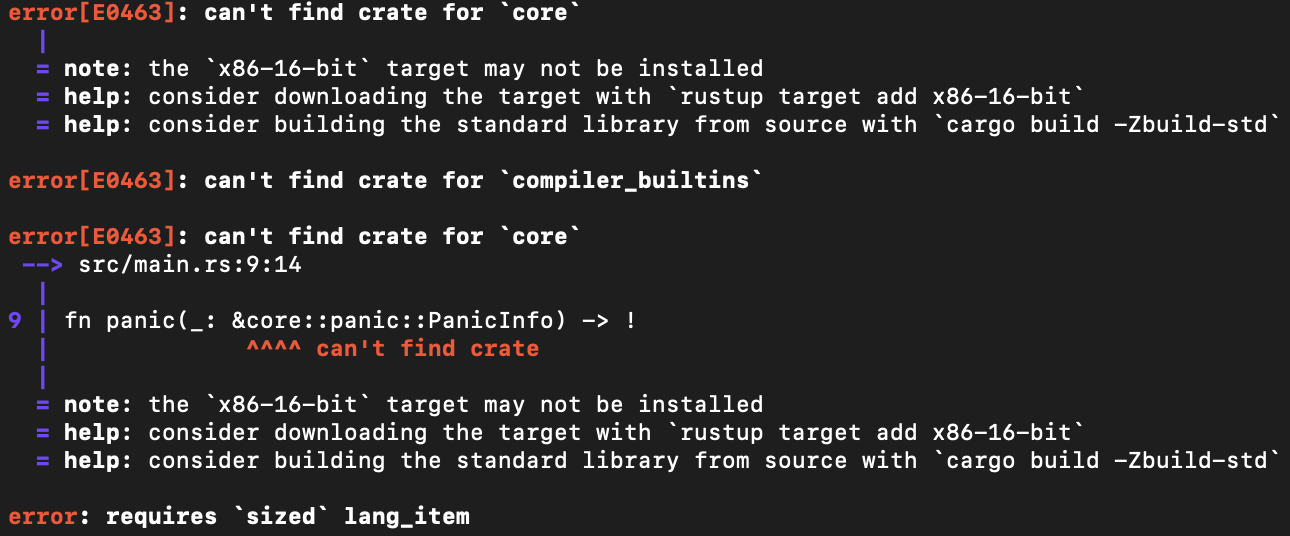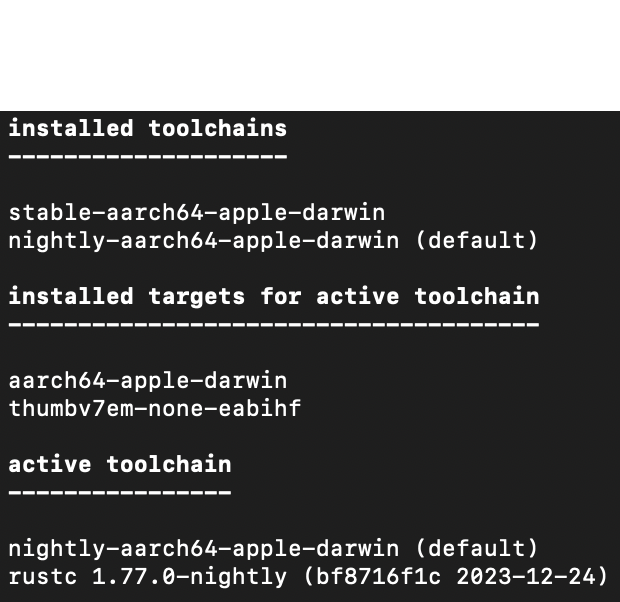A Bare Metal x86 Rust Binary
Rust code by default generates programs that are run on your personal machine, which may or may not be the right architecture (x86). The goal of this section is to create a Rust project that compiles specifically for the desired x86 architecture, regardless of what your personal machine's architecture is.
🚨 DISCLAIMER: Even if your machine is x86, Rust will almost certainly not produce a binary suitable for an x86 machine when it is first powered on!! These two environments are very different. You'll (unfortunately) still need to do all the setup.
The project will contain a kernel and the first stage bootloader for now. My recommendation is to structure your project something like...
scratch_os
├── bootloader
│ └── stage_1
│ ├── Cargo.toml
│ └── src
│ └── main.rs
└── kernel
...where kernel is an empty directory for now. If you're on a UNIX system, creating this structure on the terminal looks something like...
mkdir scratch_os
cd scratch_os
mkdir bootloader
mkdir kernel
cd bootloader
cargo new stage_1
cargo new stage_1 will automatically set up the stage_1 directory for us and populate main.rs with a simple Hello, World! program. We'll reuse this once we get to stages 2 and 3 for the bootloader. Let's start writing the bootloader.
Unlinking with the Standard Library
cargo's auto-generated project has a few problems. Firstly, Rust by default links with its standard library when generating executables. In general, the Rust standard library requires OS-dependent features like a heap, networking, threads, etc. Because we don't have an operating system, we can't link to the Rust standard library. Disabling this is pretty easy, we just need to include the #![no_std] attribute to the very top of main.rs.
#![no_std]
fn main()
{
println!("Hello, World");
}
We can generate the program by executing the terminal command cargo build inside the stage_1 directory. 3 compile-time errors show up in our code.

❓ Why
cargo buildand notcargo run?
cargo runnot only compiles the project but also executes it on your personal machine. Remember, this project is intended to compile for an x86 machine on start-up.cargo buildjust compiles the project without executing it.
The first two are pretty easy to solve...
- It turns out that Rust's
println!macro requires the standard library, so we can't use it. - Whenever Rust encounters unsound code at runtime (like an out-of-bounds error), it invokes its panic handler, which is defined by its standard library. Without the standard library, we must write our own panic handler, and for now, we will just infinitely loop.
#![no_std]
fn main() { }
#[panic_handler]
fn panic(_: &core::panic::PanicInfo) -> !
{
loop {}
}
The third error specifies that the eh_personality language item is required. Its error message gives some useful information. It seems like the default target requires this eh_personality language item, but we can specify a target that doesn't.
ℹ️ INFO: Some compilers might provide a different error message with nothing about
eh_personality:

Regardless, part of this error is about the default "panic strategy" that Rust uses.
Specifying the x86 Target
By default, Rust compiles for your personal machine's target triplet, which describes the platform of a machine. A target triple contains its...
- Computer architecture (talked about in the Introduction),
- The vendor, or who supplied the machine,
- And the machine's operating system.
- We can also optionally supply an environment field. We'll actually be needing this.
Each one of these fields are separated by dashes. You can run the terminal command...
rustc --version --verbose
...to see what target triplet Rust is currently compiling for on your machine, next to host:. Most likely, it's not the target triplet of the specific platform that we want.
ℹ️ INFO: The idea of compiling a program for a different platform that isn't your own is called cross compiling. When doing OS development in C/C++, installing and setting up a "cross compiler" is not trivial.
Thankfully, every Rust compiler is a cross compiler, meaning it has the ability to compile for other platforms besides its host platform.
Let's construct a target triplet for an x86 machine on start-up. We'll then specify to Rust that we want to compile for this particular target triplet.
❗ IMPORTANT An x86 machine on start-up begins in 16-bit real mode. This will be important when figuring out its target triplet.
-
The three most commonly used computer architectures in a target triplet are...
aarch64covers machines with thearmarchitecture.i686covers the 16-bit and 32-bit versions ofx86.x86_64covers the 64-bit version ofx86.
Since an x86 machine begins in 16-bit real mode, its target triplet computer architecture is
i686. -
We are the vendors for this platform. Unfortunately, "we" are not part of the list of approved target triplet vendors. Thankfully, we can put
unknownfor that field. -
We don't have an operating system, so we can similarly specify
nonefor the field. -
Recall that a target triplet can optionally contain a fourth environment field The
i686architecture covers both 16-bit and 32-bit versions ofx86, but we can emphasize this platform's 16-bit environment by adding thecode16environment field.
Overall, the target triplet of an x86 machine on start-up is...
i686-unknown-node-code16
However, a target triple is one component of an overall target and isn't enough in this case. The way you specify a target (not just a target triple) is through a JSON file. The minimum JSON file for the i686-unknown-node-code16 target triplet is...
{
"llvm-target": "i686-unknown-none-code16",
"arch": "x86",
"data-layout": "e-m:e-p:32:32-p270:32:32-p271:32:32-p272:64:64-i128:128-f64:32:64-f80:32-n8:16:32-S128",
"target-pointer-width": "32"
}
This JSON further specifies x86 as the target's architecture. The data-layout and target-pointer-width tags specify required properties about the architecture like data types (floats, integers, pointers), stack alignment, etc.
This is where we will resolve the third eh_personality error. The eh stands for "exception handling", and Rust typically inserts a stack unwinding procedure after a panic so that no resources are leaked. This procedure, however, requires OS-specific support which we don't have.
Instead, we can change Rust's panic strategy to just abort on panic without running any clean-up procedure. We specify this by adding the following line to our JSON file:
"panic-strategy": "abort"
Since the panic strategy doesn't require any OS-dependent features anymore, the eh_personality error shouldn't be an issue.
Right now, the target file is just a standalone JSON file. Following the eh_personality error message feedback, we can tell Rust to compile for the target specified in this JSON file through its .cargo/config.toml file, which isn't present yet. Let's add this .cargo/config.toml file to the stage_1 directory...
stage_1
├── .cargo
│ └── config.toml
├── Cargo.toml
└── src
└── main.rs
The target JSON file's location (wherever you choose to store it) can be specified within this config.toml file,
[build]
target = "relative-path/from-stage-1-dir/to-your/x86-16-bit.json"
We will need multiple target specifications as we write the bootloader/operating system, so my recommendation is to have a target_specs directory just underneath the root scratch_os directory to store all the target specifications.
Now when I run the project, the eh_personality error disappears, but there's a few more issues that come up:

It seems like Rust can't find the core and compiler-builtins crates.
Compiling Core Crates
A Rust project may link without a standard library, but it must at least contain the core and compiler_builtins crates. These crates come precompiled for the most popular target triplets when we first install Rust. However, because we defined our customized target through a JSON file, Rust doesn't contain these crates pre-built for it.
Thankfully, we have the ability to compile these crates on-demand by adding this to the .cargo/config.toml file...
[unstable]
build-std = ["core", "compiler_builtins"]
This feature is still relatively new which is why it is marked with an unstable tag.
However, Rust's compiler is set to the stable channel by default, meaning all functionality this compiler provides is guaranteed to be valid forever in all future Rust versions. This however means that you cannot use any unstable features.
The nightly channel, on the otherhand, allows you to use unstable Rust features. This also means that these may be removed on a "nightly" basis. These specific unstable core crates feature has been available and valid since at least 2020, so I think it's safe to use it. Changing our Rust toolchain to "nightly" is very simple. Just run...
rustup default nightly
...on your terminal and you're good to go. To confirm that you really are using the nightly toolchain, you can run...
rustup show
...on your terminal and if you see that the nightly toolchain is the default one under the installed toolchains section, you're good to go. This is how it looks like for me...

Overwriting Rust's Entry Point
Now when we compile, there is one more error to fix where we are missing a start language item...

Most programming languages have what's called a runtime system, which is a wrapper around the typical main function that sets up the stack and inserts arguments into the correct places before main begins and cleans up resources used after main finished.
Rust has a runtime system but we don't have access to it without the standard library. A main function implies the use of Rust's runtime system, so we want to not have a main function at all by specifying the #![no_main] attribute and removing the old main function. The Rust file now looks like...
#![no_std]
#![no_main]
#[panic_handler]
fn panic(_: &core::panic::PanicInfo) -> !
{
loop {}
}
There is one last linker error:

To simplify, Rust's runtime system includes a C runtime system, so Rust projects uses C's cc linker by default, which expects a C runtime system. However, because we don't have a Rust runtime system, there of course isn't a C runtime system. Instead, we will use Rust's linker rust-lld, which does not require any runtime system, by adding these two key/value pairs to the target specification JSON file:
"linker": "rust-lld",
"linker-flavor": "ld.lld"
One last addition: By default, programs are expected to operate regardless of where they are in memory. This means any memory access will be relative to the program's start.
Our bootloader, however, requires precise control over memory: all memory accesses need to be exactly that place in memory, not some relative offset from the program start. The following addition:
"relocation-model": "static"
...overrides the default behavior, forcing the program to use absolute addressing mode and giving our bootloader the precise control it needs over memory.
Finally, Rust successfully compiles the freestanding executable at...
scratch_os/bootloader/stage_1/target/<name_of_your_json_file>/debug/stage_1
...without any errors! Granted, we can’t do much with it right now (there isn't even an entry point), but it is a completely valid x86 executable that is entirely OS-independent!
In the next section, we will make our executable useful by making it runnable on an x86 machine.